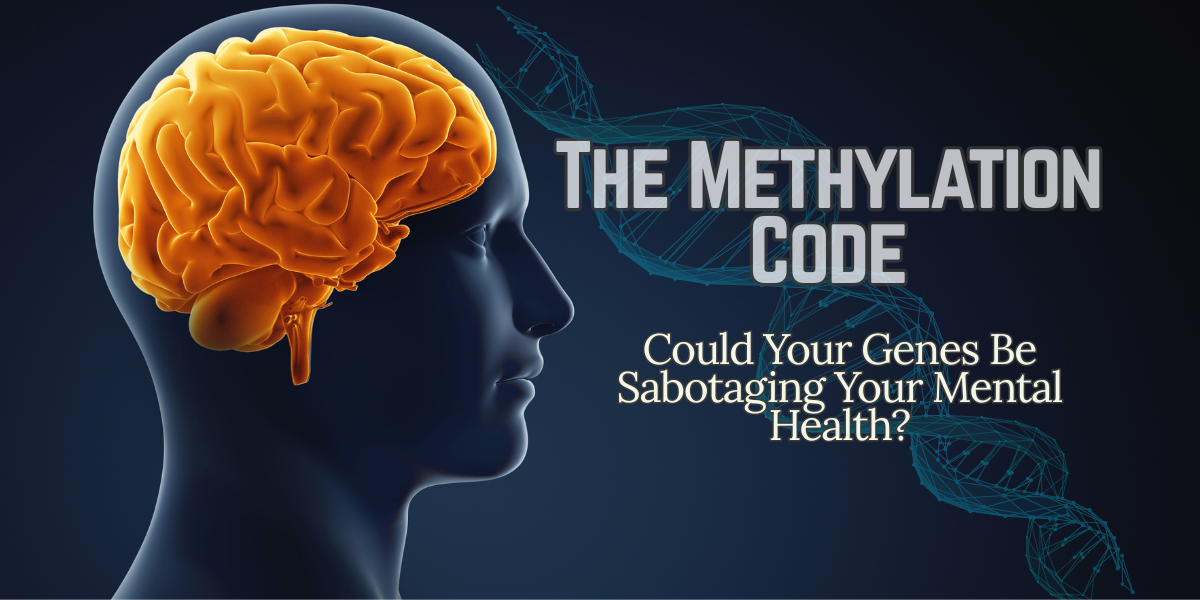The Methylation Code: Could MTHFR Genes Be Affecting Your Mental Health?
Author: Rohan Smith | Functional Medicine Practitioner | Adelaide, SA
Quick Answer
Methylation is a fundamental biochemical process involved in neurotransmitter production, DNA repair, and hormone regulation. Genetic variants in the MTHFR gene may be associated with reduced methylation efficiency, which in some individuals can contribute to mood-related symptoms such as depression or anxiety. Functional testing, including MTHFR genotyping and homocysteine assessment, may help identify whether methylation-related factors are contributing to persistent mental health symptoms.
Core Concept Explanation: What Is Methylation Anyway?
Methylation is a biochemical process in which a methyl group (one carbon atom attached to three hydrogen atoms) is transferred between molecules. This process is essential for multiple physiological functions:
- Neurotransmitter synthesis: Methylation supports the production and regulation of serotonin, dopamine, and norepinephrine.
- Hormone regulation: It assists in the breakdown and clearance of stress hormones such as adrenaline.
- Detoxification: Methylation supports liver pathways involved in processing metabolic by-products.
- Gene expression: Methylation influences how genes are expressed, contributing to epigenetic regulation.
Key Definitions
- MTHFR: An enzyme involved in converting dietary folate into its biologically active form.
- Methylfolate (5-MTHF): The active form of folate required for many neurological and metabolic processes.
- Homocysteine: An amino acid commonly used as a functional marker of methylation efficiency.
For a deeper explanation of how this pathway functions clinically, see our guide on MTHFR and methylation pathways.
Solution / Test Explained: Mapping Methylation-Related Factors
When methylation inefficiency is suspected, functional medicine testing may be used to assess contributing factors:
- MTHFR genotyping: Identifies common genetic variants that may affect folate metabolism.
- Homocysteine testing: Helps assess whether methylation pathways are under increased demand.
- SAM:SAH ratio: A functional marker used to estimate overall methylation capacity.
- Cofactor screening: Assesses nutrients such as vitamin B12, B6, riboflavin, and magnesium that support methylation pathways.
These results are interpreted together, with an emphasis on overall biochemical patterns rather than isolated findings.
When to Consider This
Methylation-related factors may be worth exploring if you experience:
- Limited response to antidepressant or anti-anxiety medications
- A family history of mood disorders or autoimmune conditions
- Adverse reactions to synthetic folic acid or standard B-vitamin supplements
- Persistent brain fog, low stress tolerance, or cognitive fatigue
In clinical practice, these patterns may overlap with presentations seen in chronic fatigue and post-viral conditions.
Next Steps to Support Methylation
Management typically focuses on reducing biochemical strain rather than attempting to “fix” genes:
- Activated nutrients: In some cases, pre-activated forms of folate (5-MTHF) and vitamin B12 are better tolerated than synthetic forms.
- Dietary optimisation: Emphasising natural folate sources such as leafy greens while reducing ultra-processed foods.
- Lifestyle influences: Sleep quality, alcohol intake, and chronic stress can all increase methylation demand.
- Cofactor adequacy: Ensuring sufficient riboflavin (B2), which supports MTHFR enzyme activity.
Methylation efficiency does not operate in isolation. Digestive health and nutrient absorption—discussed further in our overview of gut microbiome health—can significantly influence these pathways.
Frequently Asked Questions
Does having an MTHFR variant mean I will always have depression?
No. MTHFR variants are common and do not determine mental health outcomes on their own. Symptoms depend on how genetic factors interact with nutrition, lifestyle, and environmental stressors.
Can I take methylfolate without testing?
Caution is advised. Some individuals experience increased anxiety or sleep disturbance with inappropriate dosing. Testing and practitioner guidance help reduce this risk.
Can methylation-related issues affect anxiety differently from depression?
Yes. Methylation inefficiency can influence anxiety through effects on neurotransmitter balance, stress-hormone clearance, and nervous system excitability. In some individuals, impaired adrenaline breakdown or altered dopamine and serotonin signalling may contribute more to anxiety and poor stress tolerance than low mood. Symptoms depend on the interaction between genetics, nutrient status, and environmental stressors.
Key Insights
- Biochemical individuality: Mental health symptoms can reflect underlying metabolic differences rather than purely psychological causes.
- Patterns over parts: Genes, nutrients, and symptoms are interpreted together, not in isolation.
- Objective context: Functional testing may help explain why standard approaches are sometimes insufficient.
Unlock Your Genetic Context
If you’ve been told your symptoms are “just in your head,” exploring biochemical contributors may provide clarity. A structured genetic and nutritional assessment can help determine whether methylation-related factors are relevant in your case.
References
- Niculescu MD, Zeisel SH. Diet, methyl donors and DNA methylation: interactions between dietary folate, methionine and choline. Journal of Nutrition. 2002.
- Stahl SM. Mechanism of action of serotonin selective reuptake inhibitors. Journal of Clinical Psychiatry. 2008.
- Miller AL. The methylation, neurotransmitter, and antioxidant connections between folate and depression. Alternative Medicine Review. 2008.
- Hamms M, et al. Epigenetic mechanisms in mood disorders. Current Opinion in Psychiatry. 2015.
- Fenech M. The role of folic acid and vitamin B12 in genomic stability of human cells. Mutation Research. 2001.
- Folstein M, et al. Folate, vitamin B12, and serum homocysteine levels in neuropsychiatric disorders. Psychopharmacology. 2007.
- Wan L, et al. MTHFR polymorphisms and psychiatric disorders: a review. Frontiers in Genetics. 2018.
- Seshadri S, et al. Plasma homocysteine as a risk factor for dementia and Alzheimer’s disease. New England Journal of Medicine. 2002.
- Obeid R, et al. Homocysteine and folate in mental health and neurological disease. Journal of Inherited Metabolic Disease. 2013.
- Bottiglieri T. Folate, vitamin B12, and neuropsychiatric disorders. Progress in Neuro-Psychopharmacology & Biological Psychiatry. 2005.
- Kennedy DO. B vitamins and the brain: mechanisms, dose and efficacy. Nutrients. 2016.
- Hill M, et al. Folate status and antidepressant response. Journal of Clinical Psychopharmacology. 2018.
- Coppen A, Bolander-Gouaille C. Treatment of depression: time to consider folic acid and vitamin B12. Journal of Psychopharmacology. 2005.
- Roffman JL, et al. MTHFR polymorphisms and risk for schizophrenia and mood disorders. Biological Psychiatry. 2007.
- Smith AD, Refsum H. Homocysteine, B vitamins, and cognitive impairment. Annual Review of Nutrition. 2016.

